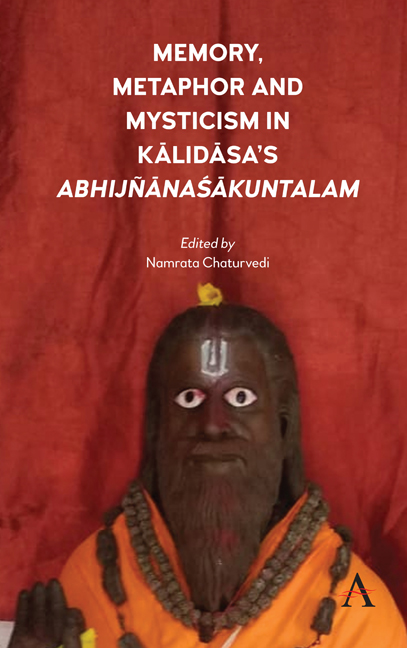Chapter 11 - Staging Śakuntalā in India: Observations andReflections
Published online by Cambridge University Press: 23 February 2022
Summary
This article is a memoir cum critical overview ofdramatic productions in Sanskrit in newlyindependent India, informed with experientialunderstanding of conceiving, performing andorganizing productions of AbhijñānaŚākuntalam and other plays ofKālidāsa.
After receiving my primary education in a municipalschool in Allahabad, Uttar Pradesh, my life ofśāstric educationbegan as a student of Sanskrit in a traditionalSanskrit Mahāvidyālaya (college) of Allahabadwhich is about two hundred years old. This is thesame institution known as DharmajñanopadeshPāthashāla in which Mahāmanā Pandit Madan MohanMalaviya, the great national leader and the founderof Banaras Hindu University, Varanasi, received hisprimary education under a great saint and scholar ofthe nineteenth century, Shrī Haradeva Guru.
Besides imparting śāstric education on traditional lines,this Pāthashāla hada long tradition of performing Sanskrit plays. Iappeared on the Sanskrit stage in 1950. I was hardly14 when I acquired fluency in Sanskrit. My fathertaught me the correct articulation of Sanskrit in mychildhood. By the 14th year of my age, I could readstorybooks (like the Panchatantra) in original Sanskrit andselections from the Rāmāyana and the Mahābhārata with ease. Now, dramaopened before my eyes a new world of a very richSanskrit repertoire.
It was the period of newly won independence and theatmosphere was still charged with pre-independencetheatrical tradition. I watched the professionalRamalilā Mandali's performances of Ramalīlā and theproductions of the popular religious and patrioticplays mostly presented on a proscenium theatre andin a style of Parsi theatre; the emergence of thenaturalistic/realistic theatre was not far away.However, being familiar with Parsi theatre, I couldfeel the throbs of the traditional theatre which onefeels while performing the great Sanskrit classicsin original text as one is able to feel the power ofthe language and the residual magic of the theatrefor which they were written in the past. However,that theatre survived only in Kerala in the form ofKudiyattam, which was not within my reach at thattime.
I appeared in a Sanskrit play that had recently beenwritten by contemporary Sanskrit playwright PtMathura Prasad Dixit.
- Type
- Chapter
- Information
- Memory, Metaphor and Mysticism in Kalidasas AbhijñnaŚkuntalam , pp. 215 - 224Publisher: Anthem PressPrint publication year: 2020



